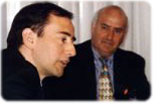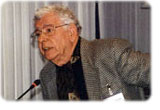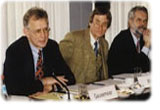Outlining the Future
Perspectives on Societal Development in the 21st Century
Workshop, March 23, 1999, CAP, Munich
Summary
Program
Participants
Word-Download: Executive Summaries, Program, List of Partipants.
|
Outlining the Future Perspectives on Societal Development in the 21st Century Workshop, March 23, 1999, CAP, Munich Summary Program Participants Word-Download: Executive Summaries, Program, List of Partipants. |
|||||
| |
Executive Summary Links lead to summaries of presentations. I. The Discrepancy Between Politics and Society  Networking
and digitalization are working fundamental, lasting changes on modern
economies and altering the underlying assumptions of both society and
politics. Unfortunately, political actors and institutions are among the
last to recognize these changes. Established structures in industrial
and post-industrial societies are dissolving, but politics "is acting
as if all of these structures were still completely stable," as Werner
Weidenfeld observed in reaction to a presentation by Uwe
Jean Heuser. Many signs point to a real loss of political institutions'
ability to steer change in a networked world. Weidenfeld also observed
that politicians seem to be giving up their ambitions to lead in the face
of the dynamics of the digital revolution. Networking
and digitalization are working fundamental, lasting changes on modern
economies and altering the underlying assumptions of both society and
politics. Unfortunately, political actors and institutions are among the
last to recognize these changes. Established structures in industrial
and post-industrial societies are dissolving, but politics "is acting
as if all of these structures were still completely stable," as Werner
Weidenfeld observed in reaction to a presentation by Uwe
Jean Heuser. Many signs point to a real loss of political institutions'
ability to steer change in a networked world. Weidenfeld also observed
that politicians seem to be giving up their ambitions to lead in the face
of the dynamics of the digital revolution.In Heuser's view, politics can recover its position and offer new answer to the extent that it frees itself from outmoded structures, that it recognizes the differences between forms and functions. Heuser cited the conception of the welfare state as a "provider of universal happiness" as an example of outmoded thinking. New social initiatives are plugging the gaps that cry out for political response. What can the state do? Heuser said the state should offer more subsidiary solutions and organize itself more participatively in order to offer citizens support as they take solutions into their own hands. Gerow von Randow, who leads the Reform Workshop at Die ZEIT together with Heuser, took a similar line in his remarks. He spoke in favor of more elements of direct democracy; "everyone cooperates, everyone has responsibility." For the networked world, von Radow offered the metaphor of the city, a place of vibrant subcultures and coincidental encounters. In such a world improved communications improve the chances for many kinds of reform, as experiments multiply and work to learn from one another. Josef Janning, the Deputy Director of the CAP expressed a certain skepticism about participatory forms of electronic democracy. Each person believes that his or her opinion will be taken into account, but that will not necessarily be the case. With these objections, Janning opened the field to the question of how systems will be steered in the future, of whether we are entering an "era of technocracy that dares not speak its name." In Janning's view, a social structure based on networking can easily lead to decision processes that are no longer based on convincing fellow citizens but rather on comforting every articulated opinion. Societal decisions will be made that express diverse opinions in the results but that do not allow for convincing and changing views in a discursive process. It is far from clear, in Janning's view, that the expression of the totality of opinions will actually lead to clear consensus on decisions that must be made. II. Technology, Nature, Changing Behavior  Attacks
on nature inevitably come back to haunt us, often wth a very long reaction
time. This central thesis from the talk by Frederic
Vester was also a running theme in the discussion that followed. Vester
took it up himself when he said that without a change in our values and
our consumer behavior we are headed for ecological catastrophe. Sustainable,
environmentally compatible technologies will not, by themselves, be enough
to protect us. As Vester said, "We must change our behavior, either willingly
or under the pressure of events." He noted that reinsurance companies
are already paying for the consequences of climate and environmental damage
and are taking action to minimize their losses. These actions are not
just cutting back on coverage but also researching the causes and workings
of environmental change and working to modify social behaviors. Attacks
on nature inevitably come back to haunt us, often wth a very long reaction
time. This central thesis from the talk by Frederic
Vester was also a running theme in the discussion that followed. Vester
took it up himself when he said that without a change in our values and
our consumer behavior we are headed for ecological catastrophe. Sustainable,
environmentally compatible technologies will not, by themselves, be enough
to protect us. As Vester said, "We must change our behavior, either willingly
or under the pressure of events." He noted that reinsurance companies
are already paying for the consequences of climate and environmental damage
and are taking action to minimize their losses. These actions are not
just cutting back on coverage but also researching the causes and workings
of environmental change and working to modify social behaviors.Peter Hennicke, Deputy Director of the Wuppertal Institute for Climate, Environment and Energy, took on Vester's point of view in the discussion. Although at the end of the day he agreed with Vester, Hennick pointed out the real effects and improvements available through efficient and regenerative technologies. These offered the chance to bring our society into better balance with the envrionment, but had to be introduced along with a process of social learning so that, for instance, climate protection in 2050 could be valued more highly than taking the car out for a spin today. Politics and market must offer models that accept and integrate nature into human processes. III. What Should Future Scenarios Do?  That
scenarios are not predictions was not disputed. Scenarios of the future
can work as early warning systems that combine empirical analysis and
trends with precise descriptions of social developmments to offer working
strategies for contemporary or future problems. Jürgen
Gausemeier of the Heinz Nixdorf Institute demonstrated how shaping
factors and detailed analyses of particular fields can be combined through
scenario techniques to provide useful insight into future developments.
These tools are not always welcomed by decision makers, noted Hans-Jürgen
Nantke, leader of the Federal Envrionment Ministry's working group "Agenda
21." Why are scenarios unwelcome in areas such as tourism or agricultural
policy, he asked. Probably because leaders are unwilling to accept the
true state of affairs or the decisions forced by a clear statement of
facts. That
scenarios are not predictions was not disputed. Scenarios of the future
can work as early warning systems that combine empirical analysis and
trends with precise descriptions of social developmments to offer working
strategies for contemporary or future problems. Jürgen
Gausemeier of the Heinz Nixdorf Institute demonstrated how shaping
factors and detailed analyses of particular fields can be combined through
scenario techniques to provide useful insight into future developments.
These tools are not always welcomed by decision makers, noted Hans-Jürgen
Nantke, leader of the Federal Envrionment Ministry's working group "Agenda
21." Why are scenarios unwelcome in areas such as tourism or agricultural
policy, he asked. Probably because leaders are unwilling to accept the
true state of affairs or the decisions forced by a clear statement of
facts.Gero von Randow brought up another aspect of the uses to which scenarios can be put. In his view, they serve the function of building group dynamics. As an instrument of underpinning pre-existing goals or opinions, they were less useful, but as a means for getting the parties to an issue to think together rather than in opposition, they could be very helpful. Karlheinz Steinmüller agreed, adding that future research should avoid formulating goals and values, but rather open up possibilities. |
||||
Project Background | Events | Reports and Essays Zukunftszeugen | Contact Us | Home Page Last Modified: 2002-04-23 TOP |
|||||